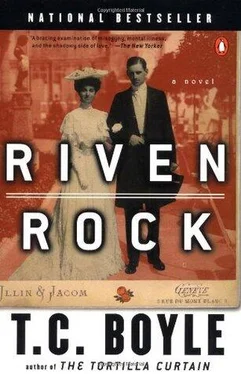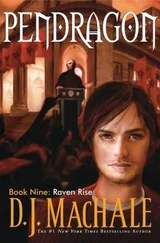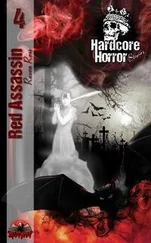T. Boyle - Riven Rock
Здесь есть возможность читать онлайн «T. Boyle - Riven Rock» весь текст электронной книги совершенно бесплатно (целиком полную версию без сокращений). В некоторых случаях можно слушать аудио, скачать через торрент в формате fb2 и присутствует краткое содержание. Год выпуска: 1999, Издательство: Penguin Books, Жанр: Современная проза, на английском языке. Описание произведения, (предисловие) а так же отзывы посетителей доступны на портале библиотеки ЛибКат.
- Название:Riven Rock
- Автор:
- Издательство:Penguin Books
- Жанр:
- Год:1999
- ISBN:нет данных
- Рейтинг книги:5 / 5. Голосов: 1
-
Избранное:Добавить в избранное
- Отзывы:
-
Ваша оценка:
- 100
- 1
- 2
- 3
- 4
- 5
Riven Rock: краткое содержание, описание и аннотация
Предлагаем к чтению аннотацию, описание, краткое содержание или предисловие (зависит от того, что написал сам автор книги «Riven Rock»). Если вы не нашли необходимую информацию о книге — напишите в комментариях, мы постараемся отыскать её.
Riven Rock — читать онлайн бесплатно полную книгу (весь текст) целиком
Ниже представлен текст книги, разбитый по страницам. Система сохранения места последней прочитанной страницы, позволяет с удобством читать онлайн бесплатно книгу «Riven Rock», без необходимости каждый раз заново искать на чём Вы остановились. Поставьте закладку, и сможете в любой момент перейти на страницу, на которой закончили чтение.
Интервал:
Закладка:
It was late in the afternoon by the time she got home, and she found Stanley waiting for her on the front steps, highly agitated. His collar was torn, there was a gash over his left eye and his lower lip was yellow and crusted. He’d had a fight with the dentist or the dentist’s receptionist or a man in the waiting room or the taxi driver who brought him there, she could see that in a minute, one of a thousand fights, fights that would go on till he was stopped. Or killed. She took one look at him and wanted to walk right on by, sick to death of him, ready to call it quits, send him back to his mother, anything, but the choice wasn’t in her hands, not this time.
The minute he saw her he leapt to his feet and grabbed her arm. “You — you can’t leave me like that,” he said, breathless, the veins swollen in his neck above the slashed collar. “Who was it,” he demanded, forcing her up the steps and against the slab of the door, “one of your boyfriends? But-Butler Ames? Huh? Tell me!”
“I’ve been at the Institute,” she said.
“Lies!” he spat. “All lies!”
She told him he was hurting her — and he was, the strength of him, his hand like a ligature right there above her elbow — but he just kept repeating “Who was it?” over and over again. Then she took her key out and they were in the hallway, fighting away from one another, the maid’s stricken face lost somewhere behind the plants, and then she was free of him and dashing up the stairs, his feet thundering behind. Up and up, no time to stop or reason, down the hallway and into her room, the door shut and bolted and him out there on the runner pounding and pounding. “Let me in!” he cried, and he was furious, pounding, “let me in!”
After a minute he stopped, and the fury had gone out of his voice. “Please,” he begged, “please let me in. I–I’ll be good, I will.” He was sobbing now, hot and cold, and where was the tap to turn it off, where was it? “I–I love you, Katherine. Don’t leave me.”
She clung to the door, and she found that she was crying too, a dry rasp of the throat and the water stinging her eyes. This was it, this was her life, this was her marriage, a madman in the hall and an inch-and-a-half thickness of mahogany between her and harm, yes, harm, because all of a sudden he’d begun to rage again, hammering the door with his shoulder, the bolt shivering, the frame heaving and protesting. “Go away!” she screamed.
There was no answer, not for the longest time, and she held her breath and listened, listened so hard she could hear the thoughts colliding in his head and the blood bolting through his veins, and then there was a sudden crash and the wood gave way where it was thinnest, right in the middle of the center panel, and she could see his face through the snarling hole, nothing but eyes, all eyes, seeking her out. “I’ll k-kill you, you bitch!” he roared.
She backed away from the door, all the way across the room to the bed, and he began shouting out to someone only he could see. “Jack!” he cried. “Jack London! Come on in, Jack, and we’ll both have her!”
That was when she retreated to the closet, the last place she could go, the key on the inside of the door and the door shut tight, and nothing but darkness now and fear, fear and hate, because he was what she was afraid of and that made her hate him beyond all forgiveness or consolation. Stanley. Stanley Robert McCormick, the madman, the lunatic, the nut, the sexual hypochondriacal neurasthenic. And that was what she was left with when they came and got him and they put him in the straitjacket and the sheet restraints and used all their outraged male muscle to hold him down.
But that wasn’t how she wanted to remember him, not now in the stairwell of the courthouse with the reporters shoving their faces at her and Newt Baker guiding her by that same abused elbow with a grip as gentle and tactful as it was firm. That wasn’t right. That wasn’t Stanley. No, she remembered him the way he was that night in Chicago, the ground frozen hard and his mother looming beside them in the carriage like some excrescence and demanding that they take Miss Dexter directly home: “Rush Street? Have you lost your senses?”
He’d fought for her. Stood up to his mother and made his choice. And when he came back to the carriage he was ten feet tall, her Stanley, all hers. A hush, the door pulled to, that intimate space all ordained, hot bricks for their feet under the fur robe, the pale light fading, the horses moving now through the richest haze of possibility. He was shy and awkward and he wanted to talk about Debs, “About Debs and what he said in the paper the other — the other, well, day. It was the most significant thing I‘ve—”
He never got to finish the thought, as if it would have mattered, because Debs could only take you so far, and Debs didn’t matter now and he never would again. She put her hand on his chest and felt his heart living there beneath his coat, his jacket, his shirt. “Hush, Stanley,” she said, and she felt her face move toward his through the heavy atmosphere and complex gravity of love. “You don’t need to talk now,” she whispered, “not anymore. Just kiss me, Stanley. Kiss me.”
EPILOGUE. 1947, World Without Walls
And so he died a prisoner, Stanley Robert McCormick, seventy-two years old and his hair white as bone, handsome, tall and bereft till the last. Nurse Gleason was gone, along with her stalwart charms, and Muriel gave up visiting for her own life, and though the new doctor — Dr. Russell — had a shining golden buttercup of a secretary and there was a dietician with two breasts roaming around somewhere in the depths of the house and the Italian woman, Eddie O‘Kane’s wife, cooked on in the kitchen, Stanley never got to touch any of them or hold them in his arms the way his mother had held him or the way Katherine had. She came to visit almost every day, Katherine, or every other day, because sometimes he didn’t want to see her, just refused, flatly and absolutely, and no one to make him say different, and she came haunting the streets all the way from her house in downtown Santa Barbara with the grand modern rooms and the gymnasium she’d built for him to use when he came visiting, but he never came visiting.
He couldn’t touch her either, because he’d been up in the Yukon Territory with Sitka Charley and the Malemute Kid and whole considerable teams of dogs and she wasn’t woman enough for him — no, she was an old lady, of the very properest and stiffest sort, and she sat and read to him from the paper and made him kiss her on the cheek every time she came and went. Then he became ill with pneumonia and all the florid faces and vivid formless things came back to him again and inhabited him and raised an unholy yowl of voices inside him, and the Judges were there too in their flapping black robes and no surcease. He was thirty-one years old when he was blocked the first time and he was worth six million dollars and he knew all about that because he was the comptroller and could add up two columns of figures as well as any man or mathematician alive. And when he died finally and was finally released into a world without walls or bars or restraints, he was worth thirty-four million and more, because it wasn’t his money they’d locked up — it was his body. And his mind.
Katherine inherited that money, all of it, and everything else too — the properties in Chicago that were minted of gold, the securities and stocks, Stanley’s eight grades of underwear and the house at Riven Rock with the bars on the windows and the eighty-seven acres with their views of the stunned and scoured islands and the nurses who were all through with nursing now. She sold the estate to pay the inheritance taxes and she took what was left to seed the causes and institutions she believed in — MIT, the League of Women Voters, the Santa Barbara Art Museum and Dr. Gregory Pincus, an old friend of Roy Hoskins, who developed a little yellow progesterone-based pill that would free women forever from sexual constraint. All that was to the good, but she lost the court case, despite what the newspapers said. Kempf was sent packing, that much she’d accomplished, but the McCormicks were still there in all their obstinacy and immovability and the judge had added three whisker-pulling male physicians to the board of guardians and all the wrangling went on and on. It was a partial victory, she supposed, but there was little consolation in that. Because she never did get the thing she wanted most — her husband — not until he was dead.
Читать дальшеИнтервал:
Закладка:
Похожие книги на «Riven Rock»
Представляем Вашему вниманию похожие книги на «Riven Rock» списком для выбора. Мы отобрали схожую по названию и смыслу литературу в надежде предоставить читателям больше вариантов отыскать новые, интересные, ещё непрочитанные произведения.
Обсуждение, отзывы о книге «Riven Rock» и просто собственные мнения читателей. Оставьте ваши комментарии, напишите, что Вы думаете о произведении, его смысле или главных героях. Укажите что конкретно понравилось, а что нет, и почему Вы так считаете.












